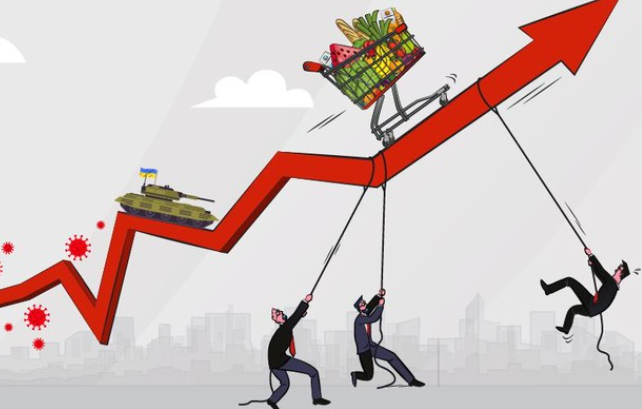Heightened tensions in the Middle East will hinder Türkiye’s efforts to get its ailing economy back on its feet amid prolonged uncertainty and raising concerns about potential shockwaves in global markets, analysts said. A Reuters poll agreed with this view, revealing that the economy will grow 3% this year and next, lower than the government’s recently updated forecasts.
According to Burak Akinci of Xinhua, one year on, the ongoing Israeli-Palestinian conflict that has also engulfed Lebanon continues unabated, with no peace in sight. Given its geographical proximity, political ties, and economic interdependence with countries in the Middle East, Türkiye, a regional power, is vulnerable to the ongoing crisis.
“The conflict in the region could disrupt energy supplies, leading to higher costs and inflation,” said Ali Oguz Dirioz, an associate professor of international relations at Ankara’s TOBB University of Economics and Technology, noting that the country is heavily dependent on imported oil and gas, primarily from countries in the Middle East.
Moreover, as Türkiye conducts significant trade with Middle Eastern countries, prolonged tensions could also disrupt trade routes, hurting exports and imports and affecting Turkish industries, Dirioz emphasized.
Over the past five years, Türkiye has been battling significant economic woes characterized by runaway inflation, a weakened national currency, and a significant current account deficit.
As of mid-2023, Türkiye abandoned an unconventional monetary policy of low interest rates and kickstarted a disinflation program that cooled down consumer price growth to below 50 percent from 85 percent two years earlier, and replenished the central bank’s reserves.
However, this favorable trend is facing geopolitical risks, said Mustafa Sonmez, an Istanbul-based independent economist.
“Geopolitical tensions often trigger financial market instability, leading to fluctuations in the Turkish lira,” which would lead to more inflation, higher borrowing costs, and as a result, a further blow to Turkish households struggling with a cost-of-living crisis unseen in decades, he told Xinhua.
Furthermore, ongoing tensions could erode investor confidence, particularly among foreign investors. Geopolitical risk factors tend to cause capital outflows and higher risk premiums, which would raise Türkiye’s borrowing costs and reduce foreign direct investment that the country is trying hard to attract for its economy, the expert noted.
In Sonmez’s view, these risks could compound Türkiye’s existing economic challenges, potentially leading to a deeper economic slowdown.
Nevertheless, while the ongoing tensions primarily present economic risks for Türkiye, there are some potential opportunities for the country, according to Dirioz.
Tensions might push European nations to seek alternative energy routes that bypass conflict zones, thereby increasing demand for Turkish pipelines, while regional businesses might shift trade and investment to more stable countries amid instability, such as Türkiye, the analyst noted.
Reuters poll: Economic growth to decelerate
Turkey’s economy will grow 3% this year and next, lower than the government’s recently updated forecasts, a Reuters poll of economists showed on Monday, pointing to a much deeper slowdown as authorities seek to douse rampant inflation.
Poll respondents also unanimously agreed the central bank would hold its key interest rate at 50% on Thursday, but eventually ease policy by 250 basis points by year-end.
The drive to cool prices is expected to lower gross domestic product growth to average 3% this year and next, according to the median of 42 economists in the Oct. 8-14 Reuters poll.
That compares to the government’s prediction of 3.5% GDP growth this year and 4% next year, in its three-year policy roadmap. The economy grew 4.5% in 2023.
GDP will rise 3.6% in 2026, the poll’s median showed.
Natixis said the government had kept its promise of orthodox economic policies and announced fiscal consolidation and budget measures that had further squeezed growth and helped the central bank tackle inflation.
“The impact from a much tighter policy mix on economic activity is, indeed, seen via a number of indicators … Recession is not yet on the table though as we anticipate a slowdown in the real GDP growth,” the investment management firm said.
In the poll, economists predicted it would not significantly ease policy until next year. The bank was forecast to have reduced rates by 20 percentage points to 30% by end-2025.
Economists expect the policy rate to fall to 42.5% in the first quarter of next year and to 35.0% in the second quarter, based on the median response. They expect the cutting cycle to be completed in the third quarter of next year, leaving the policy rate at 30.0%.
The poll median showed economists expect inflation to fall to 43.5% this year and to 25.2% by the end of 2025. The government forecasts annual inflation will fall to 41.5% in 2024 and 17.5% next year.
Turkey’s current account deficit in 2024 is expected to be 1.8% of GDP this year and next, the median forecast showed, compared to a government forecast of 1.7% and 2.0% respectively.
In its recent Article IV review, IMF staff projected that economy will grow by 3% in 2024 and 2.7% in 2025. Inflation is expected to decrease to 24% by 2025 and further to 15% by 2029, with unemployment gradually declining to 9.2% by 2029.
Follow our English language YouTube videos @ REAL TURKEY: https://www.youtube.com/channel/UCKpFJB4GFiNkhmpVZQ_d9Rg
And content at Twitter: @AtillaEng
Facebook: Real Turkey Channel: https://www.facebook.com/realturkeychannel/
